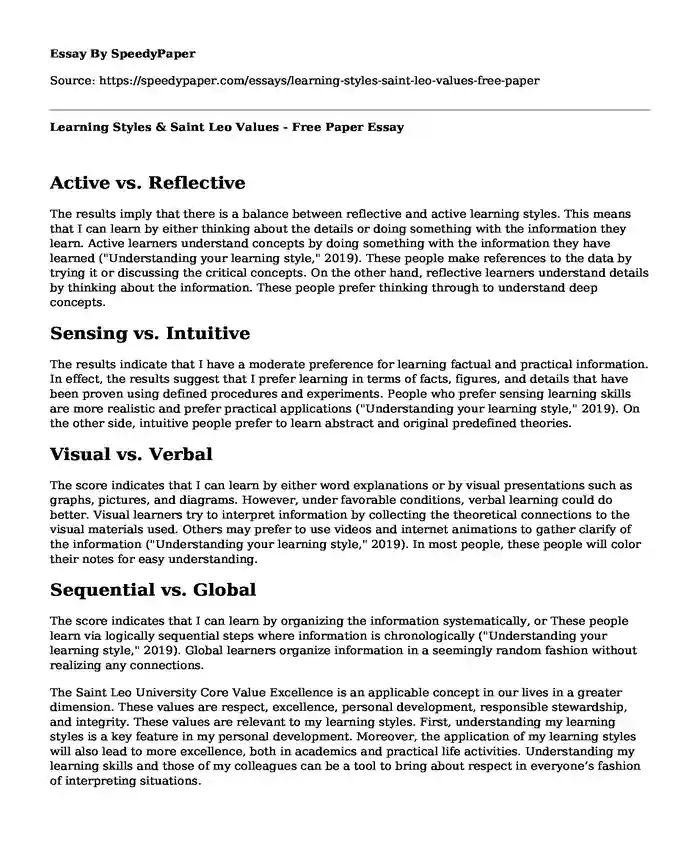Active vs. Reflective
The results imply that there is a balance between reflective and active learning styles. This means that I can learn by either thinking about the details or doing something with the information they learn. Active learners understand concepts by doing something with the information they have learned ("Understanding your learning style," 2019). These people make references to the data by trying it or discussing the critical concepts. On the other hand, reflective learners understand details by thinking about the information. These people prefer thinking through to understand deep concepts.
Sensing vs. Intuitive
The results indicate that I have a moderate preference for learning factual and practical information. In effect, the results suggest that I prefer learning in terms of facts, figures, and details that have been proven using defined procedures and experiments. People who prefer sensing learning skills are more realistic and prefer practical applications ("Understanding your learning style," 2019). On the other side, intuitive people prefer to learn abstract and original predefined theories.
Visual vs. Verbal
The score indicates that I can learn by either word explanations or by visual presentations such as graphs, pictures, and diagrams. However, under favorable conditions, verbal learning could do better. Visual learners try to interpret information by collecting the theoretical connections to the visual materials used. Others may prefer to use videos and internet animations to gather clarify of the information ("Understanding your learning style," 2019). In most people, these people will color their notes for easy understanding.
Sequential vs. Global
The score indicates that I can learn by organizing the information systematically, or These people learn via logically sequential steps where information is chronologically ("Understanding your learning style," 2019). Global learners organize information in a seemingly random fashion without realizing any connections.
The Saint Leo University Core Value Excellence is an applicable concept in our lives in a greater dimension. These values are respect, excellence, personal development, responsible stewardship, and integrity. These values are relevant to my learning styles. First, understanding my learning styles is a key feature in my personal development. Moreover, the application of my learning styles will also lead to more excellence, both in academics and practical life activities. Understanding my learning skills and those of my colleagues can be a tool to bring about respect in everyone’s fashion of interpreting situations.
References
Understanding your learning style. (2019, March 4). Centre for Teaching Excellence. https://uwaterloo.ca/centre-for-teaching-excellence/teaching-resources/teaching-tips/tips-students/self-knowledge/understanding-your-learning-style
Cite this page
Learning Styles & Saint Leo Values - Free Paper. (2023, Dec 20). Retrieved from https://speedypaper.com/essays/learning-styles-saint-leo-values-free-paper
Request Removal
If you are the original author of this essay and no longer wish to have it published on the SpeedyPaper website, please click below to request its removal:
- The most difficult academic problem you have overcome
- Introduction to Philosophy, Essay Example
- Case Study of Patagonia. Business Essay Example.
- Free Essay Sample on Customs and Language
- Free Essay: The Importance of Relationships with Children in the Context of the Classroom
- Application Essay Example: Post-Master's Certificate PMHNP Statement of Goals
- Free Essay: Statement of Purpose for Applying Software Development
Popular categories





